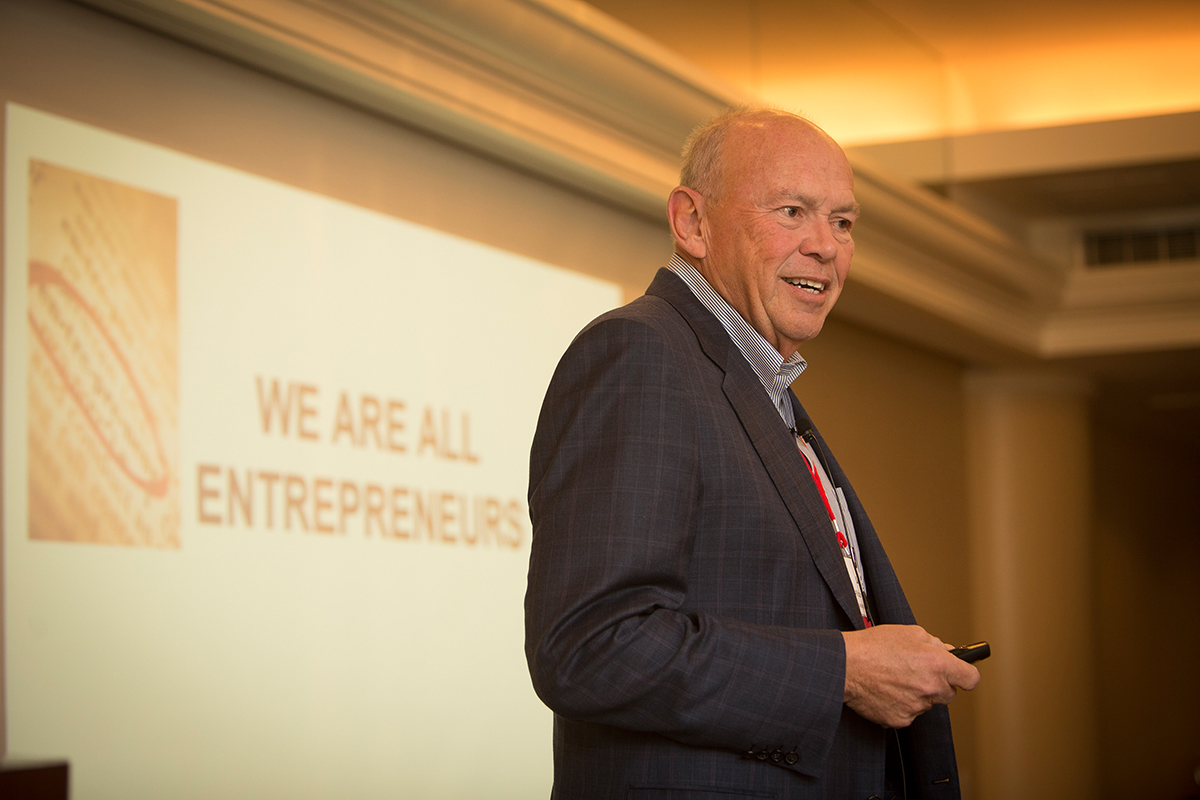Pillsbury: Success for entrepreneurs stems from courage, balance
By Susan Kelley

If anyone knows what it takes to be an entrepreneur, it’s Leland “Lee” Pillsbury ’69. The 2016 Cornell Entrepreneur of the Year shared lessons learned during his illustrious career with the next generation of Cornell entrepreneurs April 15.
“Most important, it’s the jockey, not the horse. It’s you as an individual and the management team that’s far more important than the business idea,” Pillsbury said.
With serious moments and a sprinkling of jokes, he gave an animated keynote speech at a luncheon honoring 2016 Student Business of the Year nominees. The previous evening, Entrepreneurship at Cornell had presented Pillsbury with its Entrepreneur of the Year award, given annually to a Cornellian who exemplifies entrepreneurial achievement, community service and high ethical standards. Both events were part of Entrepreneurship at Cornell’s annual entrepreneurship Celebration April 14-15.
Pillsbury is chairman of Thayer Lodging, part of Brookfield Hotel Properties. He serves as a senior adviser to Brookfield and is active in hotel real estate transactions and travel technology. Pillsbury has played a major role in the launch of more than 15 new companies and is a founding investor in Thayer Ventures, a venture capital fund targeting hospitality and travel technology companies.
Prior to founding Thayer, Pillsbury spent 19 years at Marriott, where he led the company’s entry into time sharing, Fairfield Inns and Residence Inns.
Pillsbury is an active member of the Cornell Board of Trustees and its executive committee and a member of the School of Hotel Administration’s (SHA) Dean’s Advisory Board. In 2006, Pillsbury and his wife, Mary, endowed the Pillsbury Institute for Hospitality Entrepreneurship at SHA.
Pillsbury began his talk on the theme “we are all entrepreneurs,” noting that entrepreneurs share a strong work ethic – even while sleeping, Pillsbury said. “I keep a notepad on my bedside table, and every morning there’s a to-do list from when I woke up at 2 or 3 in the morning,” he said.
Balance is a crucial element to achieving one’s goals, he said, citing the case of Tiger Woods, the celebrated golfer whose personal problems eventually overcame his game, Pillsbury said.
“To be successful in any one domain in your life, you’ve got to have balance in all the other domains: your professional life, your family, your wife, your self, your God.”
Entrepreneurs also must learn how to risk failure with courage, taking action in the face of uncertain outcomes. Citing his wife, Mary, as the most courageous person he knows, he described her sangfroid as she did barrel rolls while flying a jet fighter and rappelled a 300-foot cliff looking straight down.
Perseverance – the ability to deal with criticism, rejection and pressure – is another trait of entrepreneurs. Pillsbury quoted President Calvin Coolidge, who said that neither talent nor education can take the place of perseverance.
“The truth is that all of you wouldn’t be [at Cornell] if you didn’t already have a great deal of perseverance,” he said.
Lessons learned during his career include that every startup will eventually confront the need to pivot in order to stay on track. Even companies with an extraordinarily good business plan will only be 80 percent on point, he said. But in order to pivot successfully, the entrepreneur will need more EQ – emotional intelligence – than IQ, he said.
That’s a challenge for young people, because our education system through high school molds kids to excel as individual performers, not as team members, Pillsbury said. “However, when you get out of the academic world, that’s the last time that matters,” he said. “Now what matters is … can you be a team leader? Can you function where one of the team members may be someone you don’t like? Those are the skills that will determine how successful you are as an entrepreneur.”
He left the students with this thought: No matter what success they have in their lives they will owe some piece of it to Cornell. He encouraged them to give back by supporting the university financially if they have the means and by returning to campus soon after graduating to mentor the next generation of entrepreneurs.
“Students will need to hear from their peers, from people who are dealing with the current situation, not things that happened when I graduated from college, back before they had telephones,” he quipped. “My request to you is, pay it forward.”
Media Contact
Get Cornell news delivered right to your inbox.
Subscribe